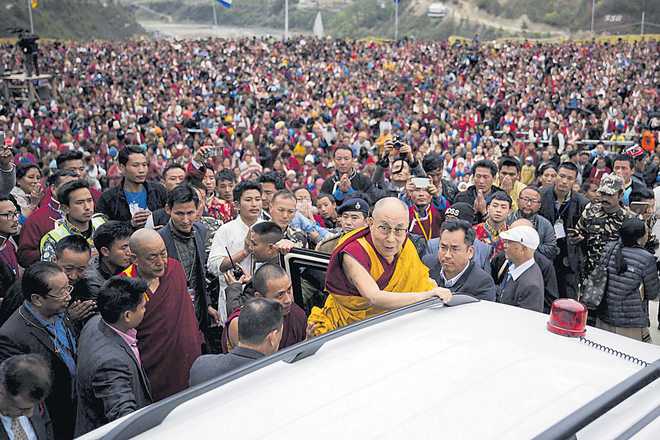
Pravin Sawhney
PONDERING over the recent spat on Arunachal Pradesh between India and China, I recalled the advice given to me by an editor from a national newspaper. He said, your articles are too kind to the Chinese point of view, and do not articulate any Indian counter-strategies.
What could be India's strategy in allowing the Dalai Lama's extended visit to Arunachal Pradesh with the junior home minister, Kiren Rijjiju in tow? Since this has not been explained by the official spokesperson, it is safe to assume that arrogance spurred the government to irk China over a sensitive border issue, on which, incidentally, India is legally, politically, and militarily on slippery grounds. The Arunachal Pradesh row was similar to the September 2016 surgical strikes against Pakistan where the gain was to feed the ultra-nationalists by demonstrating the machismo of the Modi dispensation, and reap political dividends.
The government has certainly succeeded in this aim. BJP acolytes have upped the ante over Tibet, which along with Taiwan, are China's stated core concerns which it would not compromise over. Much beyond the known Indian position that Arunachal Pradesh is an inalienable part of India, the BJP Chief Minister of the state, Prem Khandu has said that India does not have a border with China, but with Tibet. In a tweet hailed by innumerable nationalists, a senior leader of the BJP, Seshadari Chari has written: “Since we do not have a border with China, why can't we call off Indo-China border talks. We should revisit TAR (Tibet Autonomous Region) agreements.”
Before we see the damage wrought to Indo-China relations over the Dalai Lama's visit without any foreign policy gains, it would be instructive to assess the Sino-US relations under the Trump administration. Following his election victory, Donald Trump who has repeatedly name-called China during his campaign, broke the cardinal principle on which Sino-US relations are based by accepting the congratulatory telephone call from Taiwanese President Tsai Ing-wen. A reneging of the One-China Policy (which states that Taiwan is a part of China), however symbolic, was unacceptable to China. Consequently, Beijing insisted that the Trump administration publicly endorse the One-China Policy before President Xi Jinping would visit the US. This was done. What's more, in return for an assurance that China would work on a 100-day plan to assuage US' bilateral trade grievances, the US, during Xi's visit, accepted China's “new model of major power relations”, where major powers would be sensitive to each other's core concerns.
Why did Washington, the most powerful capital in the world, accept China's condition? Four reasons: One, war with China is not an option for the US since it has strategic capability to hit mainland US. Two, given the $350 billion trade imbalance in China's favour, Trump would have been reminded of former secretary of state, Hillary Clinton famous comment: “You do not go to war with your bankers”. Three, the road for the US to temper the irrational North Korean regime goes through China. Four, given China's twin advantage of geography and deep pockets, by which it has shredded ASEAN unity, stability in Asia-Pacific demands that the US and China learn to respect each other.
Coming back to Arunachal Pradesh, which China calls South Tibet, Beijing advised and even warned Delhi to desist from using the Dalai Lama card. Reacting to Indian supposed insensitivity to its core concern, Beijing renamed six Arunachal towns in Mandarin with declaration that more re-naming would follow. This was perhaps China’s way of indicating that its minimalist position for the border dispute settlement — the Tawang tract — had been revised. Undeterred, India responded that China's re-naming would not change the fact that Arunachal Pradesh is India's territory. The ball is now in China's court; India, in Beijing's views has not expressed contrition for the Dalai Lama visit. Not expected to let go the Tibet issue, what could China do next? It could express its displeasure by not agreeing to a meeting between Prime Minister Modi and Xi when they meet at the coming BRICS and SCO summits. China could even consider more than that if India's jingoism does not abate. It could insist on implementing the still- pending 1996 “Agreement on Confidence- Building Measures in the Military Field” along the Line of Actual Control (LAC) in the next round of special representation talks. This agreement has not been executed since the two provisions of the earlier 1993 “Border Peace and Tranquillity Agreement” have not been discussed and hence implemented by the two sides.
Former National Security Advisor, Shivshankar Menon, mentioned these provisions in his book Choices. The first is about “military forces in areas along the LAC” and the other relates to “mutual and equal security.” Whichever way the bilateral decision on the two issues is made, India, given its military preparedness would be at a huge disadvantage. For example, China, unlike India, has excellent infrastructure along the LAC and strong capabilities in cyber, space and electromagnetic warfare. This gives it many options to showcase its military power short of war. These include military coercion, perhaps a repeat of the April-May 2013 Depsang incidence on the LAC; or, cyber warfare where it has unparalleled offensive capabilities; or, with proven anti-satellite capabilities, it could shoot Indian satellites in both geo-synchronous and low-earth orbits. The reality is that China has capabilities and options to embarrass India.
We could end up with the nightmarish situation of hostility with two nuclear-armed neighbours with which we have military lines to safeguard.
The writer is editor, “Force” newsmagazine



























